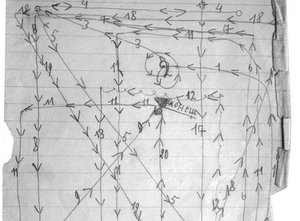
You are invited to participate in the online panel
“Ukrainian Literature Through the Genetic Lens”
organized by the
Centre for Creativity Research
(Jagiellonian University in Cracow, Faculty of Polish Studies)
9 December 2021, Thursday
6 p. m. Warsaw time / 5 p. m. London time / 11 a.m. Chicago time
Join Zoom Meeting
https://us02web.zoom.us/j/2187583567?pwd=Rmh3NGZxRVc0eHpqOU5JbHgxSXdhZz09
Meeting ID: 218 758 3567
Our program:
1. Dmytro Yesypenko (University of Alberta, Edmonton)
“On embryos of literary texts and editorial challenges: Ukrainian genetic tradition and Borys Hrinchenko's prose”.
As Almuth Grésillon once pointed out, the vocabulary of geneticists in the 1970s and onwards is full of metaphors for (child) bearing and gestation. Surprisingly, similar references on "embryos" of literary texts can be found in the works of Ukrainian literary scholars as early as half a century before their French colleagues, in the 1920s. Dmytro's presentation highlights some features of the formation and current state of affairs in Ukrainian genetic criticism. His talk also focuses on the difficulties of presenting the “fluid” authorial text in a recent edition of the prominent Ukrainian writer Borys Hrinchenko.
2. Olena Haleta (Ivan Franko National University of Lviv, Department of Literary Theory and Comparative Literature)
„From Textual Genesis to Affective Poetics: Unfinished Novel by Bohdan Ihor Antonych”
This study examines the unfinished novel “On the Other Bank” by Bohdan Ihor Antonych, a notable Ukrainian writer of the interwar period (1909-1937). Analysed from the perspective of genetic criticism, Antonych’s manuscripts are treated as an avant-text, demonstrating a 'scenario of writing' in transition from the “novel of action” to the “novel of state”. The research is focused on the dynamics of writing, not on the dynamics of the plot; since such dynamics is based on emotional and psychological movement, and not on the change of events or judgments, it is considered to be an example of affective poetics in Ukrainian modern literature.
3. Discussion
4. Centre for Creativity Research: forthcoming events.
Dr hab. Mateusz Antoniuk,
Head of the Centre

